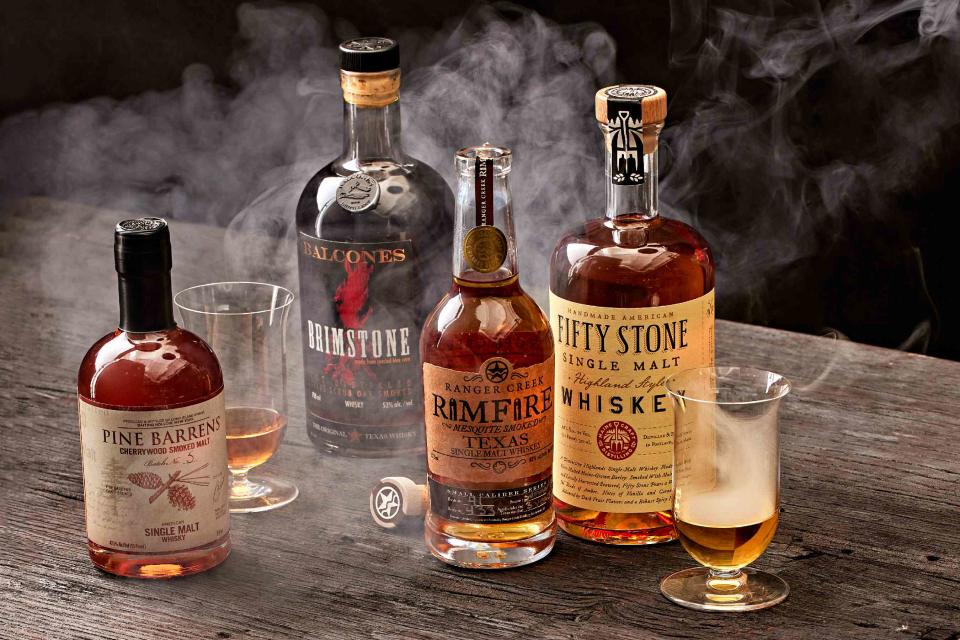You've Got the Wrong Idea About Smoky Whiskey
There’s more than peat when it comes to the category's best bottles.

Frederick Hardy II / Food Styling by Margaret Monroe Dickey / Prop Styling by Christine Keely
Scotland is famous for its smoky whiskeys, which get their character from the peat fires traditionally used to dry malted barley. Now, a new generation of craft distillers is creating a diverse world of smoky whiskeys, using regional wood and other fuel sources to add their own sense of place to each sip.
At Balcones Distilling in Waco, for example, Texas scrub oak adds smoke to Brimstone, a whiskey made from blue corn. Texas does have peat bogs, head distiller Jared Himstedt says, but for most of his customers, the scent of scrub oak is far more familiar. “To a Texan, what kind of smoked whiskey is going to feel like home?” he asks. “The guy that we get our wood from, all of his other customers are barbecue joints.”
That local flavor goes beyond a hint of brisket. Himstedt roasts Brimstone’s blue corn before mashing, which adds a nutty sweetness that reminds many fans of another dinner favorite. “So all of a sudden, you’re having barbecue, but you’re having some sweet cornbread with it,” he says. “It’s all kind of there together in the whiskey.”
For Richard Stabile, founder and master distiller at Long Island Spirits in New York, cherrywood felt like the right choice for a smoky American single malt. “George Washington chopping down the cherry tree is kind of synonymous with America,” he says. “It’s a mid-Atlantic thing. From Virginia to Massachusetts, there’s a lot of cherry trees around.”
Related:28 American Whiskies Worth Splurging on This Year
His spirit, Pine Barrens Cherrywood Smoked Malt, shows off fruity cherry notes, backed up by caramel, malt, and spice. The smoke, Stabile notes, is present but understated. “We weren’t looking to do a smoke bomb,” he says. “It’s just a beautiful cherrywood flavor profile.”
This trend isn’t limited to the U.S., nor do all craft distillers eschew peat. In Thuisbrunn, Germany, the tiny Elch distillery makes a single malt called Torf vom Dorf, meaning “peat from the village,” using just that. In Sweden, Mackmyra distillery offers Svensk Rök, or “Swedish smoke,” for which it smokes its own malt with Swedish white-moss peat and juniper twigs. While the peat evokes Scotland, Mackmyra master blender Angela D’Orazio says that the juniper connects the spirit to the Swedish hearth. “It adds to the local tones,” she says. “We use juniper berries when we cook our elk stews in Sweden. It’s absolutely part of our heritage.”
The indie nature of craft whiskey means that distillers are free to add smoke in any number of ways, and in keeping with the craft sensibility, they do. Stabile buys New York state cherrywood and gets help from a neighbor with a backyard meat smoker. Himstedt won’t reveal the process he uses with Brimstone, but he notes that it’s the whiskey itself that is smoked, not the corn used to make it. In San Antonio, Ranger Creek Brewing and Distilling fashioned its grain smoker out of an old shipping container, which it uses to make its mesquite-smoked Rimfire. Head distiller Josh Gardner says that having an on-site smoker allows for lots of fun experiments, which are then offered to the distillery’s club members. “We’re really starting to play with different types of wood to show our club members how much the smoke can influence the whiskey,” he says. “This quarter, we’re releasing an applewood-smoked version, which is probably my favorite.”
For Himstedt, making a smoked whiskey like Brimstone is about more than just local flavors. Distillation is driven by science, while working with wood adds a dose of unpredictability and nuance from batch to batch. “The fire is a partner in the process,” he says. “It’s something you have to learn to dance with and play with, and that’s exciting.”
Six Great Smoky Whiskeys
Ranger Creek Brewing and Distilling Texas Rimfire ($34)
Mesquite smoke pairs with hints of chocolate and tropical fruit in this Texas single malt.
Rock Town Distillery Hickory-Smoked Whiskey ($41)
The first legal distillery in Arkansas since Prohibition adds the classic flavors of American hickory to this wheat whiskey.
Mackmyra Svensk Rök ($46)
Local peat and fresh juniper twigs connect this “Swedish Smoke” whiskey to the flavors of Swedish cuisine.
Maine Craft Distilling Fifty Stone Single Malt ($50)
This is one of the only whiskeys made using malt smoked with American peat.
Balcones Distilling Brimstone ($50)
Smoked with Texas scrub oak, this unusual blue corn whiskey offers barbecue, campfire, and cornbread notes.
Long Island Spirits Pine Barrens Cherrywood Smoked Malt ($50)
Custom-smoked malt gives a gentle cherrywood aroma to this Long Island craft single malt.
For more Food & Wine news, make sure to sign up for our newsletter!
Read the original article on Food & Wine.

